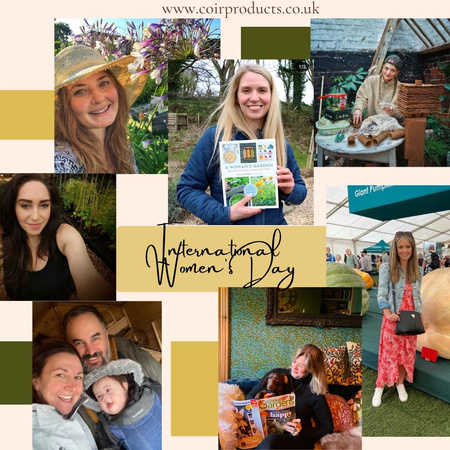How can women help drive a sustainable future?
How can women help drive a sustainable future?
Issues such as climate change not only threaten the health of our planet, but also the well being of generations to come. Amidst such challenges, sustainability continues to dominate policy debates and discussions. Yet, what does it mean to live sustainably, what does a sustainable future look like, and what role could women play in driving such a future?
At CoirProducts.co.uk, we recognise and promote sustainable horticultural practices. In celebrating International Women’s Day this year, we at CoirProducts.co.uk spoke to various growers and gardeners, who shared with us the importance of adopting sustainable practices in our everyday lives and reminded us about the power of collective voices.

For gardener and author, Tanya Anderson (Lovely Greens • Natural Soap Recipes & Organic Gardening Tips), a sustainable future is one where we can all live well without harming the planet, where there is balance between human spaces and wilderness. Yet, looking towards a better world involves improved access to basic needs and opportunities. Highlighting the role women can play, Tanya says, “if we support those under our care and in our communities, and even further afield, we can also spread the ideas that could take us closer to a sustainable future.”
This thought is also echoed by other growers and gardeners. Blogger and gardener, Kelly Haworth (IG @Ohhomelygirl urges us to “be teachers”. She says how “knowing how to grow food, herbs and natural medicine was once a domestic skill every family had to master.” Yet, in a constantly changing world, Kelly’s aim is to be more self-sufficient, relying more on clean, homegrown food. This is a skill she hopes to pass on to her children, with the hope they do the same with their children.
For gardener, Jo (IG @pritchy_plants, a sustainable future would recognise and celebrate the local, whether it’s locally grown flowers or produce, or supporting small local businesses, garden centres, or suppliers. Meanwhile, Lydia, who is a medical herbalist, highlighted the importance of organic growing and promoting biodiversity using techniques such as no digs, permaculture, biodynamics, and more. She notes how such practices promote nature, encourage life and feed people in a local and more sustainable manner, while also encouraging businesses to adopt more sustainable practices.
Hayley Brown (IG @Hayleys_lottie_haven, who adopts organic and no-dig methods at her allotment, emphasises that “everyone needs to take responsibility for themselves” in working towards a sustainable future. She goes on to say how tiny changes can make a huge difference. Recognising the value of community, she adds, “the allotment site is a great place for learning and discussing environmental issues with people from all walks of life. If there’s one thing us gardeners talk about the most, it’s the weather and we all know that’s being directly influenced by climate change.”
Keen upcycler, Kay Maynard (IG @brook_cottage_, spoke about some of the sustainable practices she adopts at home with her family, including planning meals ahead, minimising food wastage, and organising a household recycling day.
Sustainability involves better understanding how our actions impact the world around us. In working towards a sustainable future, Sandy of Good Roots Barn (Plastic Free Gardening | Good Roots Barn) believes as consumers, we have immense power in making sustainable choices, which in turn would encourage businesses to adopt changes the world needs for a sustainable future. Being aware of where a product comes from, how it is made, and the raw material used is important. Sandy sees value in the collective voices of women, as she says, “we can use our voices, especially those who run small businesses.” As Sandy says, with women driving approximately 70-80% of all consumer purchasing, women can continue to play a key role in choosing more sustainable products.
